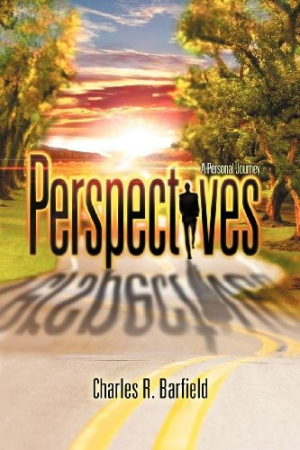Perspectives
A Personal Journey
In Perspectives, Charles R. Barfield’s poetry takes on a number of complex themes: race, urban poverty, civil rights, love, and the breakdown of the body. His background in public service gives him a unique perspective from which to write, but the details of his experience rarely make it to the page. As a result, much of what Barfield says often sounds tired and expected, though there are moments of levity when he talks about aging as a man.
Barfield holds two Master’s degrees: one in social work, one in public administration. He cofounded the first methadone drug treatment program in Pittsburgh and helped to create a community health center in his neighborhood. He worked as a housing director in a community revitatlization program and later as a supervisor of foster care and adoption for the state of Connecticut. Such rich experiences give him authority to talk about these subjects, but many of the stories he must have gathered on his journey remain untold.
In the short rumination “Liberation of the Mind: A Personal Perspective,” Barfield writes of his thoughts on race and self-identification, particularly as a man of color. Unfortunately, there is little specific narrative detail given to guide the reader toward understanding the writer’s own epiphanies. In “Aging,” Barfield restates what so many have said before him: “Youth, the ephemeral translucent vision of the young, think that their tomorrows will be no different than the present, no different than the elders thought in their youth. The more things seem to change, the more they stay the same.” It seems that Barfield has come to this conclusion through living, but he fails to ground his understanding of it in anything concrete.
Other writers from similar backgrounds have successfully integrated their experience with that of those around them, as was the case with Richard Wright and Sandra Cisneros. Using those voices Barfield has heard in his community work to articulate experience may be a way to achieve a more strongly resonating poem. In “Reefer,” the author laments drugs use—“Reefer over food, food stamps for a high / Reality substituted for lies. / Illusions unbridled on a grand scale.” The idea may not be new, but the language could be—in its rhythm, detail,and image—the character at its heart could be as Bigger Thomas was in Native Son and as Esperanza was in The House on Mango Street. Indeed, the short prose poem chapters of Mango Street offer an example of how multiple subjects can be covered in intimate and interesting ways.
Love poems are woven through the book as well, but they also suffer from a lack of specificity. Though, in “My Appetite, My Ding Dong, and Me: For Men Over Forty Looking to Recapture Dreams of Yesterday” and “Male Menopause,” Barfield playfully, and refreshingly, talks about the betrayals of the aging body in an original way.
Barfield’s themes certainly deserve attention, but the pieces in this collection would have more impact were they grounded in specific detail and narrative.
Reviewed by
Camille-Yvette Welsch
Disclosure: This article is not an endorsement, but a review. The publisher of this book provided free copies of the book and paid a small fee to have their book reviewed by a professional reviewer. Foreword Reviews and Clarion Reviews make no guarantee that the publisher will receive a positive review. Foreword Magazine, Inc. is disclosing this in accordance with the Federal Trade Commission’s 16 CFR, Part 255.

